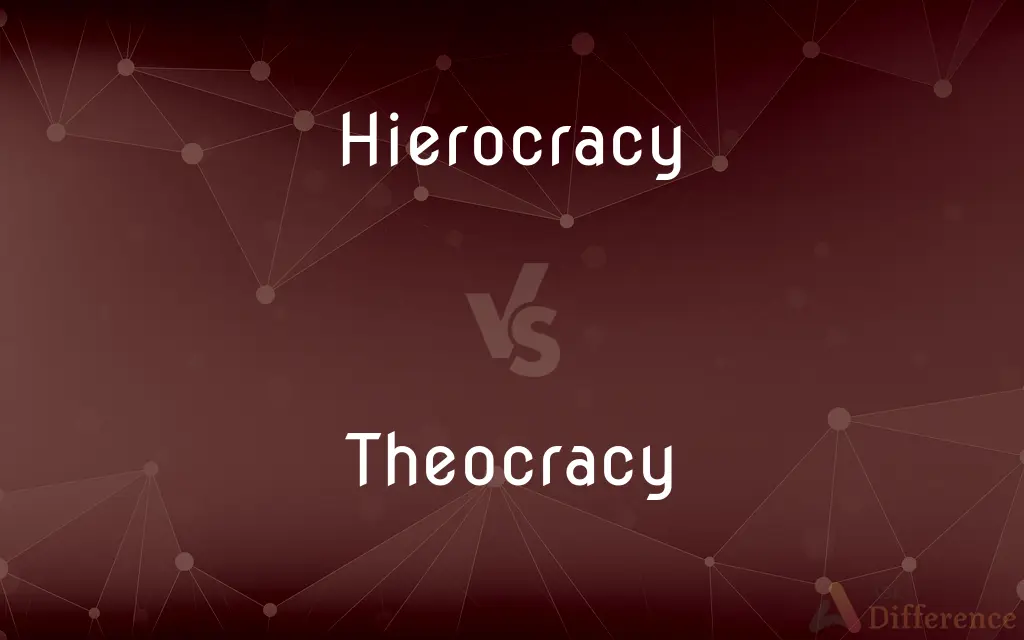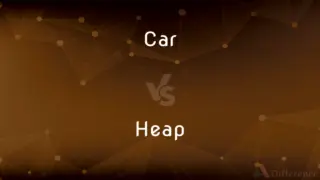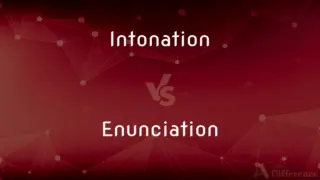Hierocracy vs. Theocracy — What's the Difference?
By Maham Liaqat & Fiza Rafique — Updated on April 8, 2024
Hierocracy refers to a government or society ruled by the clergy, emphasizing religious leadership's power. Theocracy is a form of government where God is recognized as the supreme civil ruler, with laws presumed to be divine.

Difference Between Hierocracy and Theocracy
Table of Contents
ADVERTISEMENT
Key Differences
Hierocracy signifies a form of governance or social order where the clergy or religious leaders hold significant power, often controlling both spiritual and administrative aspects of society. Whereas, theocracy is a government system where God or a deity is recognized as the supreme ruler, with the state's legal system based on religious law, and officials often believed to be divinely guided.
In a hierocracy, the authority and legitimacy of the leaders stem from their religious positions and the organizational structure of the religion itself. On the other hand, a theocracy typically operates on the premise that the law and governing principles are divinely ordained, with leaders serving as intermediaries or executors of God's will.
While hierocracy focuses more on the power and role of the clergy within the government and society, emphasizing their leadership and administrative roles, theocracy encompasses the broader concept of divine governance, where all political and legal authority is seen as deriving from a higher spiritual power.
The implementation of a hierocracy often involves a structured religious hierarchy determining the governance and direction of society. In contrast, a theocracy might not necessarily rely on a religious hierarchy but on the belief that the law itself is a direct manifestation of divine will, with or without a central religious authority.
Both hierocracy and theocracy can lead to a government where religious leaders play a central role in administration and policy-making. However, the key difference lies in the source of authority: hierocracy derives power from the religious institution and its hierarchy, while theocracy bases its authority on the belief in divine rule through religious law.
ADVERTISEMENT
Comparison Chart
Definition
Government or society ruled by the clergy.
Government where God is the supreme civil ruler.
Authority Source
Religious positions and hierarchy.
Presumed divine law and divine guidance.
Focus
Power and role of the clergy in leadership.
Implementation of divine governance and law.
Governance Structure
Often involves a structured religious hierarchy.
Based on religious law, may or may not have a central religious authority.
Example
The Vatican, with its governance by the ecclesiastical hierarchy.
Ancient Israel, where laws and leaders were considered divinely guided.
Compare with Definitions
Hierocracy
Authority is derived from religious office and hierarchy.
The influence of clergy in a hierocracy can extend to various societal aspects.
Theocracy
A government where divine authority guides law and leadership.
In a theocracy, laws are believed to reflect divine commands.
Hierocracy
Involves clergy in leadership and administrative roles.
Clergy in a hierocracy may oversee education and social services.
Theocracy
May operate without a central religious figure.
In some theocracies, the law itself, rather than a religious leader, is seen as the ultimate authority.
Hierocracy
Emphasizes the leadership role of the religious establishment.
The administrative structure in a hierocracy often mirrors the religious hierarchy.
Theocracy
Authority is presumed to be based on divine law.
Leaders in a theocracy are often seen as executors of God’s will.
Hierocracy
A government ruled by religious leaders.
In some historical hierocracies, bishops and priests held significant political power.
Theocracy
Embraces the concept of divine governance.
Theocratic governments might enforce laws directly derived from sacred texts.
Hierocracy
Government by the clergy; ecclesiastical rule.
Theocracy
Theocracy is a form of government in which a deity of some type is recognized as the supreme ruling authority, giving divine guidance to human intermediaries that manage the day-to-day affairs of the government.The Imperial cult of ancient Rome identified Roman emperors and some members of their families with the divinely sanctioned authority (auctoritas) of the Roman State. The official offer of cultus to a living emperor acknowledged his office and rule as divinely approved and constitutional: his Principate should therefore demonstrate pious respect for traditional Republican deities and mores.
Hierocracy
Government by ecclesiastics.
Theocracy
Government ruled by or subject to religious authority.
Hierocracy
The doctrine that the pope held supreme temporal, and not just spiritual, power.
Theocracy
A country or state governed in this way.
Hierocracy
Government by ecclesiastics; a hierarchy.
Theocracy
Government under the control of a state religion.
The Vatican City State is a Pope.
Theocracy
Rule by a god.
Theocracy
Government of a state by the immediate direction or administration of God; hence, the exercise of political authority by priests as representing the Deity.
Theocracy
The state thus governed, as the Hebrew commonwealth before it became a kingdom.
Theocracy
A political unit governed by a deity (or by officials thought to be divinely guided)
Theocracy
The belief in government by divine guidance
Common Curiosities
How is authority determined in a hierocracy?
Through religious positions and the organizational hierarchy of the religion.
What is the basis of law in a theocracy?
Laws are presumed to be divine, reflecting the will of God or a deity.
How does theocracy differ from hierocracy?
Theocracy is based on the belief in divine rule and laws, while hierocracy emphasizes clergy's governance role.
Are hierocracies common today?
They are less common but can be observed in various forms, particularly in religious city-states or communities.
What are examples of theocratic governments?
Historical examples include ancient Israel and some Islamic states, where laws and governance were/are based on religious principles.
How do citizens participate in a hierocracy?
Participation can be influenced by one's role within the religious structure, with varying degrees of influence based on clerical status.
How does a hierocracy impact social services?
Religious leaders may control or significantly influence education, healthcare, and welfare, based on doctrinal priorities.
What is hierocracy?
Governance or societal order where clergy or religious leaders hold significant power.
Can a hierocracy and a theocracy coexist?
Yes, in some cases, a hierocracy can function within a theocratic framework, where religious leaders govern according to divine law.
What role do religious texts play in a theocracy?
They often serve as the primary source of legal and moral authority.
Can a theocracy exist without a central religious leader?
Yes, if the legal and governmental systems are based on divine law, even without a singular religious figurehead.
How does leadership function in a hierocracy?
Leadership is typically based on religious rank and hierarchy, with clergy overseeing both spiritual and administrative duties.
Does a theocracy necessarily enforce religious law on all citizens?
Typically, yes, though the extent and manner can vary widely depending on the specific theocratic principles in place.
What historical changes have affected hierocracies and theocracies?
Factors include secularization, global interconnectedness, and shifts in religious and political thought, affecting their prevalence and form.
What challenges can arise in a theocracy?
Issues can include interpretation of divine law, the balance of power, and integration with global secular systems.
Share Your Discovery

Previous Comparison
Car vs. Heap
Next Comparison
Intonation vs. EnunciationAuthor Spotlight
Written by
Maham LiaqatCo-written by
Fiza RafiqueFiza Rafique is a skilled content writer at AskDifference.com, where she meticulously refines and enhances written pieces. Drawing from her vast editorial expertise, Fiza ensures clarity, accuracy, and precision in every article. Passionate about language, she continually seeks to elevate the quality of content for readers worldwide.














































